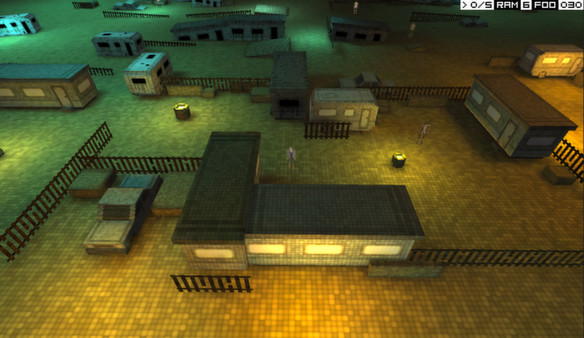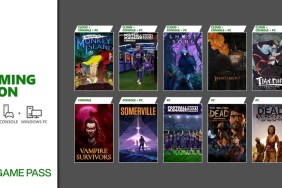Game Over, man. Game Over!
Exploring the final days of one of six video game characters as they find themselves wandering the Random Access Memory after using up all of their available lives, Continue is creator Jason Oda’s interpretation of his personal experiences, including experimenting with "Peruvian jungle drugs" and enduring "a brush with death while hopelessly lost in the mountains of New Mexico." Oda’s single-minded approach to recreating these experiences in his video game is equal parts alienating and brilliant, though it is certainly not for everyone.
Above all else, Continue is a memory game. Out of a possible eleven locations, you are given six to explore, which range from a village built beneath a volcano, to a trailer park inhabited by Juggalos. You must acquire information from the citizens of each level, with some asking you to part with Foo (cash) in exchange for opening a locked door, others imparting useful wisdom which you will use to aid you in your quest for inner peace, and the majority not being of much use at all. You will be tasked with remembering the valuable information, which is helpfully indicated via an on-screen prompt, and then using this information to answer questions asked of you behind certain doors.
Answering these questions correctly will reward you with either Lightning or Prayer. Lightning will help destroy a few of the blockades preventing you from escaping the world, while Prayer will build a new shelter that you’ll use to escape from the Garbage Collectors, godlike enemies who are looking to permanently dispose of you.
It is inevitable that the Garbage Collectors will get to you, though it is not your goal in Continue to outwit death, but rather to survive long enough to learn to accept your fate. You achieve this by successfully traversing through each level, which are each split into a number of timed rounds. Between each round you must attempt to gather as much Lightning and Prayer as you possibly can, before the timer runs out and you are then thrust into one of a variety of mini-games. Some of these games see you traversing through short side-scrolling levels, while others place you in a Zelda-esque dungeon. Completing these mini-games successfully awards you keys to unlock more doors, while failing them will see you sacrificing a plentiful amount of Foo, a Car Part (they’re also obtained by talking to people and they have no value outside of prolonging your life), or destroying a few of the shelters you have built.
There’s a good amount of variety in these mini-games, though a wonky combat system and enemies with poor hit detection mean that you’ll often find yourself aimlessly slashing your sword, your sole weapon in Continue, in front of you as you’re bombarded by Garbage Collectors. Encountering these Garbage Collectors, with their humorously primitive cube-with-a-toothy-mouth design, provides more frustration than it does a reasonable challenge.

This frustration carries over into the most crucial part of the game, when you must find shelter from the Garbage Collectors in the town you have built using the Prayers you have obtained. In these segments, you are required to hide in a shelter as the Garbage Collectors send down bolts of lightning to destroy them. As each bolt of lightning strikes, a shelter is destroyed. However, the amount of lightning the Garbage Collectors send down is randomized, meaning that you can sometimes find all of the shelters you have tirelessly worked for destroyed in one fell swoop. This makes Continue an immensely difficult game to “complete," though that is also sort of the point.
Continue features multiple endings depending upon how far you progress. Sometimes your character will bow out of his/her life with resignation, or do so with a sense of fear, much like reality. The existential dread your character is suffering with in Continue is portrayed masterfully, and the difficulty you will have in helping the character find peace before an untimely demise is perhaps a necessary move on behalf of creator Oda in order to successfully convey the game’s message.

Beneath all the garbled text falling from the mouths of your in-game peers, Continue does have purpose and is successful at fulfilling it. The spiritual journey your hero embarks on is complemented by washed-out, voxel-esque visuals, which befit the melancholic tone of the game. Each level is interspersed by short cutscenes in which your character will contemplate its existence, skipping stones along the ocean or resting at a campfire and remembering times spent with an old family pet. The real highlight of Continue is its gorgeous orchestral soundtrack, which for my money rivals Journey’s as the best, most atmospheric score used in a game in this past decade.
Continue?9876543210 is a game I am glad I had the chance to experience, and for all its flaws it’s still a smart, hauntingly beautiful adventure. However, it lacks the accessibility of some of its other cerebral peers such as Papers, Please and The Stanley Parable, and as such, its various quirks and off-the-wall lore will likely dissuade many from delving further into it. If you’re willing to dedicate the time to truly understand it, though, then Continue will take you on an original journey, one which you’ve never embarked on before and one which you'll find nowhere else.
-
One of the most beautiful soundtracks
-
An original concept executed proficiently
-
Interesting lore
-
Oddly compelling core gameplay
-
Frustrating combat
-
High difficulty level







